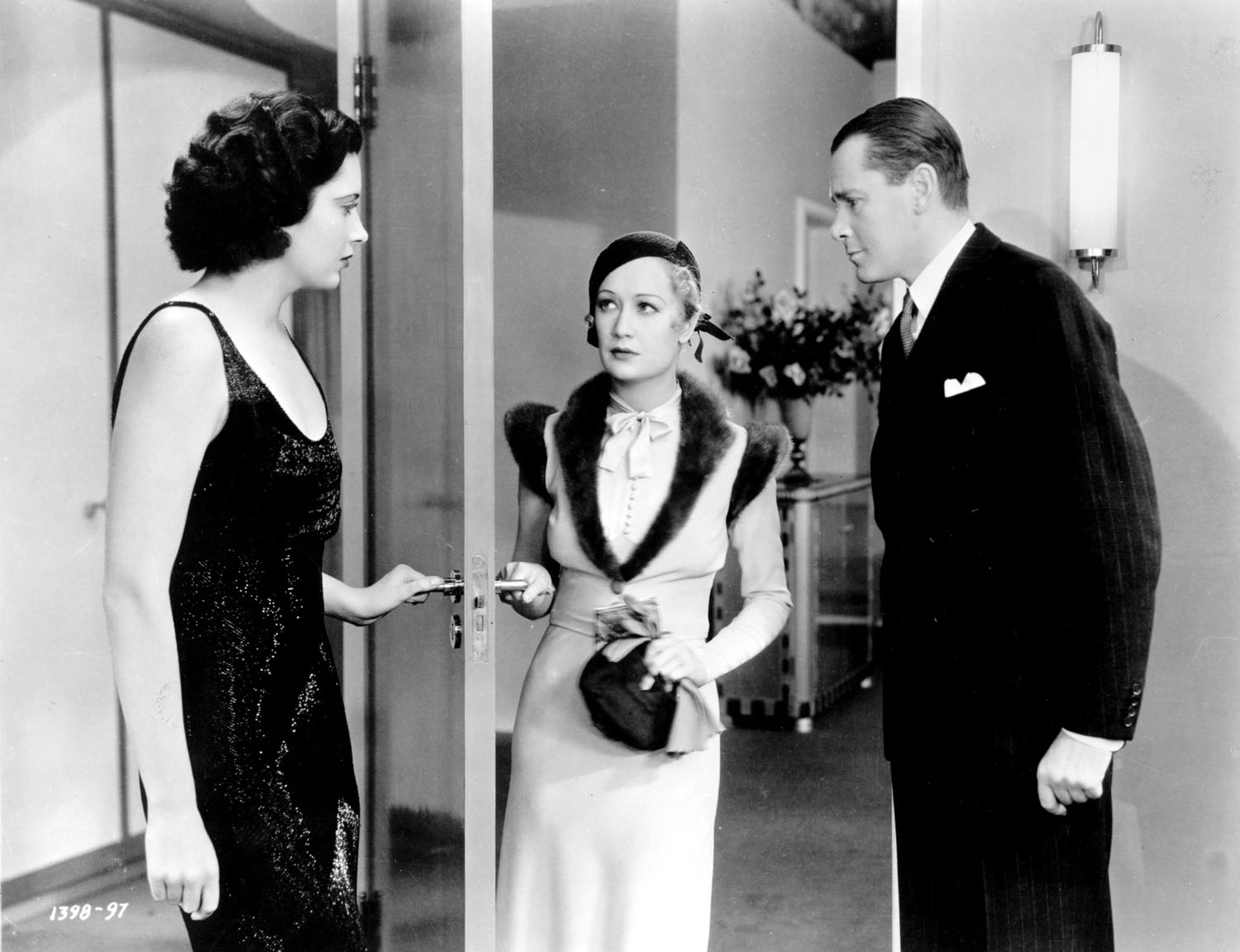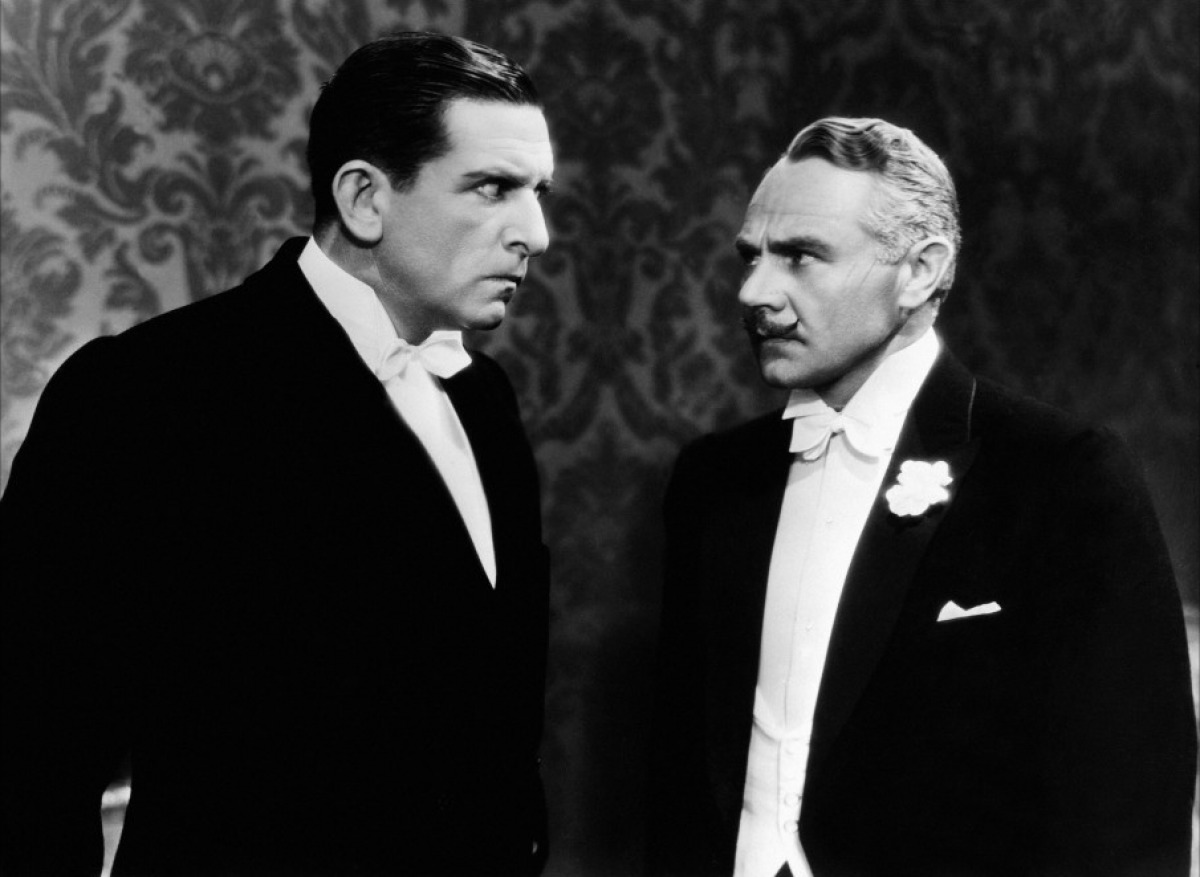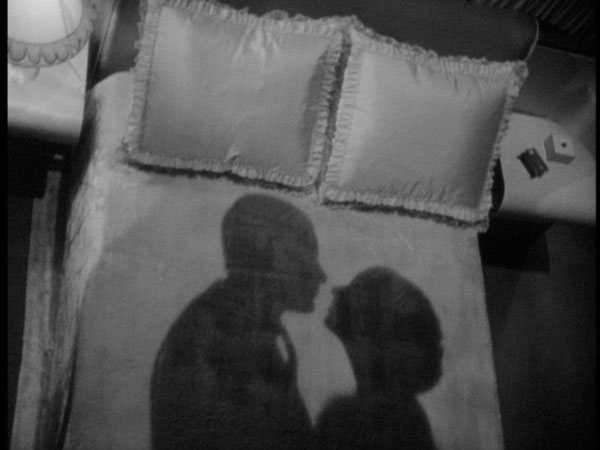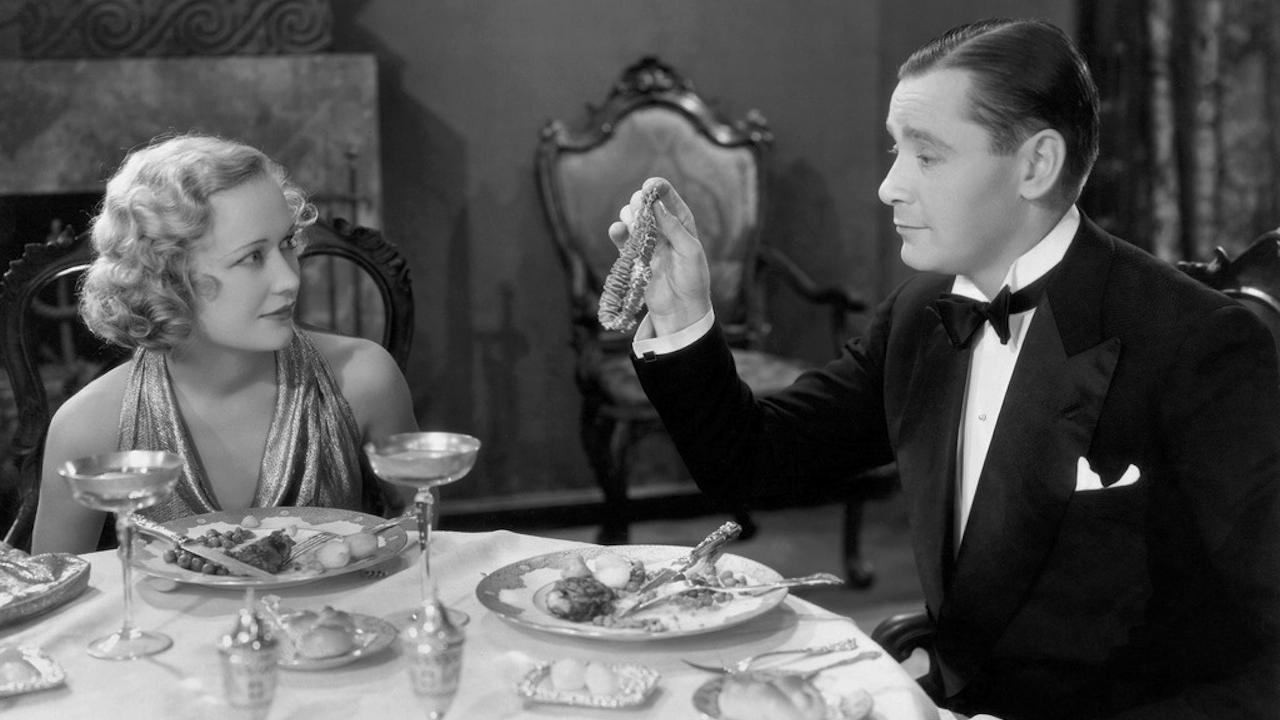Nominating the bawdiest dialog from a pre-Code film is a fool’s errand — it’s a crowded field — but this exchange, from Ernst Lubitsch‘s sparkling, smirkingly amoral Trouble In Paradise, has got to be a contender:
If I were your father, which fortunately I am not, and you made any attempt to handle your own business affairs, I would give you a good spanking – in a business way, of course.
What would you do if you were my secretary?
The same thing.
You’re hired.
This is also quoted in Ebert’s review, but it’s impossible not to mention it again. The speakers are the dashing thief and imposter sophisticate Monsieur “Gaston Leval” — aka Gaston Monescu (Herbert Marshall) — and Madame Mariette Colet (Kay Francis), the perfume company heiress he’s set out to con.
In just a few short lines, Lubitsch and his frequent screenwriter Samson Raphaelson, adapting Trouble In Paradise from stage to screen, spell out several of their priorities: snappy, screwball wit, strong female leads unafraid to express desire (though nearly always couched in a joke, with an alluring smile), and an obvious sexuality that gleefully dances around any potential censors. With a few more additions, that’s Trouble In Paradise in a nutshell.

The narrative hinges on that favorite trope, the love triangle. In Trouble In Paradise, our players are Monsieur Leval, Madame Colet, and Leval’s fellow pickpocket and brassier soulmate Lily (Miriam Hopkins). Leval and Lily meet-cute at the film’s start, but in a way only Lubitsch could pull off: both impersonating someone else, both deep in a con, both robbing each other with a smile until they recognize themselves as kindred spirits. It’s a wonderful scene of misdirection, as the audience has been given no reason to suspect either of them yet, and also indirection: by the time Lily realizes that Gaston’s one-upped her wallet theft by actually stealing her garter from off her leg, she’s head-over-heels, and not in a chaste way.
While Lily might be an accomplished thief, Leval is a master — “the man who walked into the Bank of Constantinople, and walked out with the Bank of Constantinople,” as another favorite line would have it — and the two quickly team up. Lubitsch jumps ahead years, assuming we’ll implicitly understand they’ve embarked on a number of great robberies. It’s one of many sequences in which the famous, and famously difficult-to-define, “Lubitsch touch” is on display, the aesthetic itself embodying the sophistication and fun of the characters while the director elides the passage of time in favor of the frothy and glamorous.
The rest of the plot — and I do mean plot — involves Leval and Lily’s designs on Madame Colet, who turns out not to be the easy mark they imagined. There’s romance, Madame Colet’s idiot suitors, some tension as others start to put two and two together.

Throughout it all, there’s the witty repartee and the trappings of impossible wealth. Apart from the genius introduction, we’re always one step ahead, waiting to see if and when the other characters will finally figure out the game that’s afoot.
One of the many neat tricks Trouble In Paradise pulls off — and Trouble In Paradise is nothing if not a set of neat tricks — is to encourage audience identification with a couple of thieves. There’s even something aspirational about the whole affair, evident in Gaston’s proud identification as a “self-made crook.” Unlike the already-wealthy who came into their thievery through family reputation and class privilege, Gaston made something of himself, by playing to the prejudices and dim-witted assumptions of the upper class.
In America, we’re more used to the narrative notion of stealing from the rich and giving to the poor, but Gaston’s no Robin Hood, and it’s Lubitsch’s Continental sensibility that sells the whole thing as a lark. You don’t even get the sense Gaston ever considered the second part of that adage. Mainly, he just likes taking stuff from people who have more than they need, without apology, because it’s fun and he’d rather be rich than broke. It’s not hard to see why Depression-era audiences might’ve enjoyed that.
The inherent staginess of the material is undercut time and again by Lubitsch’s choices. The elision of time is one example; the fluidity of the camera, and its ability to suggest, is another. One famous shot pairs Madame Colet’s dreams of the future with the image of her and Gaston’s shadows on her bed. For all the constant talking, Lubitsch is only too happy to let the audience make the visual connection.

Meanwhile, Kay Francis plays Madame Colet as both a woman of principle — she smilingly rejects the staff salary cuts proposed by her Board of Directors, for instance, without a moment of deference to male authority — and also someone who treats romance and sex with a clear-eyed sensibility. As Ebert notes, she “thinks she can buy [Leval] but is content to rent him for a while,” but as Tasha Robinson points out, she’s never the villain she might’ve been. And Miriam Hopkins avoids becoming a nasty, jealous stock character: she just wants her man, and we hope it works out for the two of them, amoral thieves though they are.
Everything in Trouble In Paradise proceeds apace, while our protagonists screwball their way to a delightful ending. It’s a touch wistful, a bit sad, but mostly predicated on the further adventures and fun to come. It’s hard to imagine something like this being made today — a “romantic comedy” where virtually no lessons are learned and no crime punished.
Instead, we cheer on the sexy, smart, impossibly suave criminals and wish them the best, as they take to the road to fleece some more rich folks. Go get ’em.
When I was small I liked to go to the movies because you could find out what adults did when there weren’t any children in the room. As I grew up that pleasure gradually faded; the more I knew the less the characters seemed like adults. Ernst Lubitsch’s “Trouble in Paradise” reawakened my old feeling. It is about people who are almost impossibly adult, in that fanciful movie way — so suave, cynical, sophisticated, smooth and sure that a lifetime is hardly long enough to achieve such polish. They glide.

